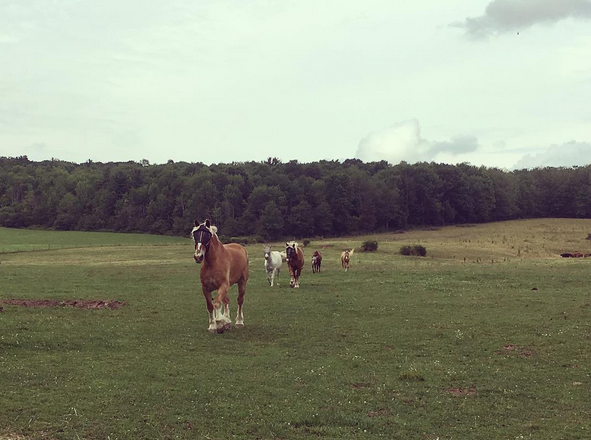
Letter From the Editor: An Identity Crisis
The horse world is divided over the probable lift on the ban on horse slaughter in the United States. The strife, argues Kristen Kovatch, may be over how we define our horses: are they pets or are they livestock?
Last week we broke the news that the House Committee on Appropriations had passed the 2018 Agriculture Bill without language defunding horse slaughter facility inspectors, thereby lifting a ban on horse slaughter in the United States that had existed for most of the past decade. As expected, reader reaction to this story was as varied as it was heated: many readers were disappointed and upset while others were relieved.
The arguments both for and against legal horse slaughter in the United States have plenty of rational support and evidence to back them up, but there are also emotional arguments on both sides — truthfully, this is an emotionally loaded issue and I spent a lot of time last week in an inner debate, trying to decide exactly where I stand on horse slaughter.
I’ve had a fairly varied horse life, working in various facets of the horse industry from training homebred Arabians on a Wyoming guest ranch while leading trail rides and herding cattle, teaching and coaching college riders while training my own reined cow horse and now enjoying a non-competitive horse life (other than the occasional fun local draft horse show) with a pasture full of semi-retirees on a beef farm. My thoughts and opinions have shifted as my experiences have changed; while I don’t profess to be an expert, I believe that my experiences have given me access to many sides of the horse world and the larger livestock industry as well.
The root of the horse slaughter debate, the cause of the rift between those for and against slaughter, in my opinion boils down to one key issue: horses are classified as livestock, but for many owners and enthusiasts, they are considered pets — and it’s impossible to truly be considered both. Horses, in the United States, are in an emotional gray area.
Livestock, by definition, refers to animals kept on a farm or ranch for commercial reasons — that could include, as examples, a dairy farm, a sheep ranch, a Thoroughbred racehorse breeding facility or a neighborhood lesson barn. Horses kept purely for recreational purposes are also classified as livestock.
That livestock designation brings with it a whole host of advantages that we all enjoy as equestrians: agricultural zoning; state and federal funding and grants; livestock-specific anti-cruelty laws; limited liability laws; and tax advantages. Sure, most of us know the truth that horses are in fact a giant money pit and very rarely actually make any money, but that commercial classification protects us in ways we might not think about on a regular basis.
But unlike a steer raised with the intentions of going to slaughter to feed a family, many horses in the United States are kept for pleasure, from the three-figure local sales “rescue” to the five-figure show hunter (no, not even those big shows are going to actually make you any money). Most horse owners view their animals as their companions, whether it’s for wandering the trails or just watching them graze in the pasture or whether they’re on the competitive circuit chasing points and ribbons. By an emotional definition, horses are closer to our pets — animals we welcome into our lives as friends. You could also keep that beef steer as a pet if you wanted to, even though slaughter facilities exist in this country: nothing is going to stop you.
It’s unimaginable to many to send your pet to slaughter at the end of his life. We cannot disregard this emotional attachment as an industry, because it’s this emotional attachment that keeps the industry going — our love for the horses as a noble partner, the other half of an equation that makes us greater than ourselves.
However, we equally cannot afford to refuse to consider the horse as a livestock animal. Just as an example, every winter the memes start to circulate: “if you’re cold, they’re cold — bring your pets inside this winter.” Imagine if you weren’t allowed to turn out your horses in the winter, even if they live outside with a coat like a yak and a sturdy shelter, much in the same way your dog cannot go outside for long periods without supervision in the wintertime. What if you had to install central heating in your barn? Imagine if your horse farm was no longer considered an agricultural enterprise and was therefore taxed accordingly.
The fact that equine slaughter facilities may re-open does not change my personal approach to my herd: I’m prepared to pay for euthanasia and disposal when the time comes for my horses. In my mind, I owe them that dignified ending on the farm where they’ve lived out their years. Yes, I love my horses as pets — but I appreciate their status as livestock as well.
No matter how horses are designated under the law, we are all able to enjoy them in the way we see fit. No law forces us to send our horses to slaughter, no matter if the plants re-open or not.
All that we can do is what we feel is best for our horses at the end of their lives. Do what is right by your horses. And go riding.






Leave a Comment